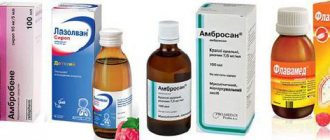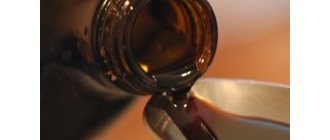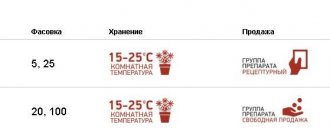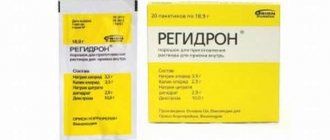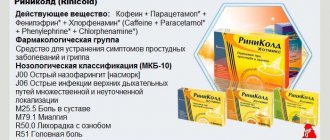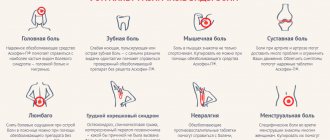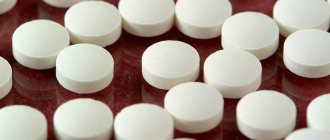Adelfan is a combined antihypertensive drug containing two active ingredients: reserpine and dihydralazine. Reserpine is a sympatholytic that increases gastrointestinal motility, slows down metabolic processes and increases the production of HCl in the stomach. It has a positive effect on protein and lipid metabolism in patients with coronary atherosclerosis and arterial hypertension, and prevents reflex tachycardia. Dihydralazine increases blood flow and reduces the smooth muscle tone of arterioles, thereby reducing resistance in the vessels of the heart, brain and kidneys.
Release form and active ingredients
Since the drug "Adelfan", which helps with high blood pressure, has an optimal combined composition, one tablet contains several active substances - Reserpine in a volume of 100 mcg and Dihydralazine sulfate in a volume of 10 mg.
In addition to the indicated Reserpine and Dihydralazine, the drug contains Hydrochlorothiazide, a substance that helps to optimally increase the release and excretion of potassium and hydrogen molecules from the patient’s body.
The medicine "Adelfan" is produced in the form of flat, round, white tablets. They are placed in blisters, each containing 10 pieces. One package contains 3 blisters.
Analogs
Sometimes situations arise when the patient’s body does not tolerate the components of the drug, reacting to them with all kinds of adverse and allergic reactions. In such cases, experts recommend choosing the most suitable analogue of a certain spectrum of action.
The most popular analogues of the drug Adelfan include:
- Enap . The medicine copes well with high blood pressure, and also eliminates unpleasant and even painful symptoms caused by vascular diseases;
- Adelfan-Ezidrex . Numerous positive reviews from patients and doctors, as well as indications for use, indicate that this is one of the most effective drugs. It belongs to the combined antihypertensive drugs that have sympatholytic, arteriodialatatory and diuretic effects;
- Tririzide . A combined drug containing diuretics and rauwolfia alkaloids. This is an analogue of Adelfan, which quickly lowers blood pressure;
- Raunatin . One of the most inexpensive drugs, which is distinguished by its safety and milder blood pressure reduction. The main component of the medicine is the plant Rauwolfia terrestrial, which is of natural origin.
Enap tablets
Adelfan can also be replaced with foreign analogues:
- Amprilan Nl;
- Accusid;
- Atacand Plus;
- Apo-Triazide.
Before taking any drug, you should consult a specialist.
Basic pharmacological properties
The active ingredients of the drug "Adelfan" are Reserpine and Dihydralazine.
The latter is capable of exerting a powerful nootropic vasodilator effect due to the suppression of the activity of catecholamines in the endings of the postganglionic sympathetic nerves of the brain tissue. As a result, optimal regulation of vascular tone is observed. This is why the drug Adelfan, which is popular among patients, effectively lowers blood pressure parameters.
In addition, Reserpine can have a sedative effect, so after even a single dose of the medication, sleep improvement is observed. The antipsychotic effect is due to a decrease in the concentration of other neurotransmitters: dopamine, serotonin, and neuropeptides.
Active vasodilator – Dihydralazine sulfate effectively reduces the tone of the smooth muscles of arterioles. This explains its hypotensive effect.
An effective thiazide diuretic, Hydrochlorothiazide, is active in the cortical segment of the renal loop of Henle and in the distal region of the tubules. Capable of inhibiting the reabsorption of chlorine and sodium ions. This leads to an acceleration of the excretion of potassium molecules, as well as hydrogen. Patients experience an increase in diuresis, which contributes to a decrease in blood volume, cardiac output, and systemic blood pressure.
By
Adelfan-Ezidrex tablet. No. 250 39929
Description
Adelfan-Ezidrex®
Novartis Pharma (Switzerland)
pills; blister 10, cardboard pack 25; No. P N014280/01, 2009-12-01 from Sandoz Private Limited (India)
Latin name
Adelphane-Esidrex®
Active substance
Hydrochlorothiazide* + Dihydralazine* + Reserpine* (Hydrochlorothiazidum + Dihydralazinum + Reserpinum)
ATX:
C02LA51 Reserpine and diuretics in combination with other drugs
Pharmacological groups
Antihypertensive combined drug (sympatholytic + arteriodilator + diuretic) [Sympatholytics in combinations] Antihypertensive combined drug (sympatholytic + arteriodilator + diuretic) [Diuretics in combinations]
Nosological classification (ICD-10)
I10 Essential (primary) hypertension I15 Secondary hypertension
Description of the dosage form
White to off-white, round, flat tablets with beveled edges, uncoated, marked “CIBA” on one side and the letters “A” and “F” on the other with a score line between them.
pharmachologic effect
Pharmacological action: antihypertensive.
Pharmacodynamics
Adelfan®-Ezidrex is a combination of three antihypertensive components that have different points of action and mutually complement each other's antihypertensive effects.
Reserpine is a sympatholytic, causing depletion of catecholamine depots in the endings of postganglionic sympathetic fibers and in the central nervous system. As a result, the ability to deposit catecholamines is impaired for a fairly long period of time. Depletion of catecholamine reserves leads to disruption of impulse transmission in the endings of the sympathetic nerves, which, in turn, leads to a decrease in the tone of the sympathetic nervous system (while the activity of the parasympathetic nervous system does not change). Thus, reserpine reduces elevated blood pressure and heart rate. In addition, reserpine causes a sedative effect. Reserpine depletes reserves of other neurotransmitters, incl. serotonin, dopamine, neuropeptides in central and peripheral neurons. These effects of reserpine may play a role in its pharmacological effects and antihypertensive effects. After oral administration of reserpine, the antihypertensive effect develops slowly; the maximum effect is achieved only after 2–3 weeks and is maintained for a long time.
Dihydralazine is an arterial vasodilator, reduces the tone of the smooth muscles of arterial vessels (mainly arterioles) and reduces peripheral vascular resistance. The mechanism of this action at the cellular level remains unclear. To a greater extent, vascular resistance decreases in the vessels of the heart, brain, kidneys and other internal organs, and to a lesser extent in the vessels of the skin and skeletal muscles. If the decrease in blood pressure is not pronounced, the blood flow in the dilated bloodstream generally increases. The preferential expansion of arterioles, rather than venules, reduces the severity of orthostatic hypotension and increases cardiac output.
Vasodilation, leading to a decrease in blood pressure (to a greater extent in dBP than in sBP), is accompanied by a reflex increase in heart rate, stroke volume and cardiac output. The reflex increase in heart rate and cardiac output can be neutralized by combining dihydralazine with reserpine, which suppresses the sympathetic nervous system.
Hydrochlorothiazide is a thiazide diuretic that acts in the cortical segment of the loop of Henle and the distal renal tubules. Inhibits the reabsorption of chlorine and sodium ions (due to antagonistic interaction with the transport enzyme Na + Cl-) and enhances the reabsorption of calcium ions (the mechanism is unknown). An increase in the amount and/or rate of entry of sodium and water ions into the cortical segment of the collecting ducts leads to an increase in the secretion and excretion of potassium and hydrogen ions. In patients with normal renal function, an increase in diuresis is observed after a single dose of hydrochlorothiazide at a dose of 12.5 mg. An increase in the urinary excretion of sodium and chlorine ions and a slightly less pronounced increase in the excretion of potassium ions depend on the dose of hydrochlorothiazide. After oral administration of hydrochlorothiazide, diuretic and natriuretic effects develop after 1–2 hours, reach a maximum after 4–6 hours and persist for 10–12 hours. Diuresis caused by thiazides initially leads to a decrease in blood volume, cardiac output and systemic blood pressure. Activation of the renin-angiotensin-aldosterone system is possible. With long-term use of hydrochlorothiazide, the maintenance of the hypotensive effect is probably ensured by a decrease in peripheral vascular resistance. Cardiac output returns to initial values, a slight decrease in plasma volume and an increase in plasma renin activity persist.
Pharmacokinetics
Absorption and plasma concentrations
Reserpine is rapidly absorbed after oral administration. Systemic bioavailability is 50%.
Dihydralazine is rapidly absorbed after oral administration. In blood plasma, dihydralazine is found predominantly in the form of unchanged dihydralazine and hydrazone substances formed as a result of metabolism of the main substance. Approximately 10% of dihydralazine is found in the blood plasma in the form of hydralazine.
Hydrochlorothiazide after oral administration is absorbed by 60–80%. The time to reach Cmax in blood plasma is 1.5–3 hours. Changes in absorption under the influence of food intake are not clinically significant. Over the therapeutic dose range, the systemic bioavailability of hydrochlorothiazide is approximately proportional to the dose. With regular use of hydrochlorothiazide, its pharmacokinetics do not change.
Distribution
The relative VSS of reserpine averages 9.1 L/kg (ranges from 6.4 to 11.8 L/kg). Binding to plasma proteins is more than 96% (albumin and lipoproteins).
Hydrochlorothiazide accumulates in red blood cells. In the elimination phase, its concentration in erythrocytes is 3–9 times higher than in blood plasma. Binding to blood plasma proteins is 40–70%. VSS in the final elimination phase is 3–6 L/kg (equivalent to 210–420 L for a body weight of 70 kg).
Metabolism
Reserpine is metabolized in the intestines and liver. The main metabolites are methyl reserpate and trimethoxybenzoic acid.
Dihydralazine is metabolized largely by oxidation (to form hydrazones) and acetylation.
Hydrochlorothiazide is metabolized to a very small extent. Its only metabolite found in trace amounts is 2-amino-4-chloro-M-benzene disulfonamide.
Removal
The removal of reserpine and its metabolites from blood plasma occurs in two phases: T1/2 of phase I is 4.5 hours; Phase II - 271 hours. The average T1/2 value of unchanged substance is 33 hours. The total clearance of reserpine averages 245 ml/min. During the first 96 hours after oral administration, 8% of the dose is excreted by the kidneys, mainly in the form of metabolites, and 62% through the intestines, mainly unchanged.
T1/2 of unchanged dihydralazine averages 4 hours. Total clearance averages 1450 ml/min. After oral administration, about 46% of the dose taken is excreted within 24 hours, mainly in the form of metabolites, mainly through the intestines. About 0.5% of the dose taken is found in the urine as unchanged substance. The elimination of hydrochlorothiazide from plasma is two-phase: T1/2 of the initial phase is 2 hours, the final phase (10-12 hours after administration) is about 10 hours. In patients with normal renal function, excretion is carried out almost exclusively by the kidneys. In general, 50–75% of an oral dose is excreted unchanged in the urine.
Pharmacokinetics in certain groups of patients (elderly age, renal failure, liver dysfunction)
In elderly patients and patients with impaired renal function, the clearance of hydrochlorothiazide is significantly reduced, which leads to a significant increase in its concentration in the blood plasma. The decrease in clearance observed in elderly patients appears to be associated with decreased renal function. In patients with liver cirrhosis, no changes in the pharmacokinetics of hydrochlorothiazide are observed. In elderly patients and patients with impaired renal function, the average therapeutic dose of Adelfan®-Ezidrex may be lower than in younger patients with normal renal function.
In patients with impaired renal and/or liver function, accumulation of dihydralazine may occur. In patients with renal failure, there is a slowdown in the excretion of reserpine, which, however, is compensated by an increase in its excretion through the intestines. In these cases, in order to avoid the accumulation of reserpine in the body, it is necessary to adjust the single dose of Adelfan®-Ezidrex or increase the intervals between doses, taking into account the dynamics of blood pressure and tolerability.
Indications of the drug Adelfan-Ezidrex®
Arterial hypertension.
Contraindications
hypersensitivity to reserpine and related substances, dihydralazine or other hydrazinophthalazines, hydrochlorothiazide or other sulfonamide derivatives, as well as to excipients;
depression (current or history);
Parkinson's disease;
epilepsy;
electroconvulsive therapy;
peptic ulcer of the stomach and duodenum in the acute phase, ulcerative colitis;
pheochromocytoma;
concomitant or recent treatment with MAO inhibitors;
systemic lupus erythematosus (idiopathic);
severe tachycardia and heart failure against the background of high cardiac output (including with thyrotoxicosis);
heart failure due to mechanical obstruction (including the presence of aortic or mitral stenosis or constrictive pericarditis);
isolated right ventricular failure due to pulmonary hypertension (“pulmonary” heart);
anuria, severe renal failure (creatinine Cl less than 30 ml/min);
liver failure;
refractory hypokalemia, hyponatremia, hypercalcemia, as well as hyperuricemia with clinical manifestations;
pregnancy;
age under 18 years (efficacy and safety have not been established).
With caution - in cases where a sharp decrease in blood pressure should be avoided, because this can lead to decreased blood flow:
patients who have suffered a myocardial infarction (should not be prescribed until the end of the stabilization period after a myocardial infarction);
coronary and cerebral atherosclerosis (as in the case of prescribing any antihypertensive drugs with a pronounced hypotensive effect).
The precautions outlined below apply not only to each component individually, but also to the drug Adelfan®-Ezidrex as a whole.
Reserpine - since reserpine increases motility and secretion in the gastrointestinal tract:
history of gastric and duodenal ulcers;
erosive gastritis and cholelithiasis;
heart failure, sinus bradycardia, conduction disorders;
patients who have recently suffered a myocardial infarction.
Dihydralazine sulfate - patients with suspected ischemic heart disease (tachycardia caused by dihydralazine can lead to an attack of angina pectoris and ECG changes indicating myocardial ischemia; in some cases, a connection between myocardial infarction and the use of dihydralazine could not be excluded).
Hydrochlorothiazide
patients taking ACEI (especially when taken together with potassium supplements or potassium-sparing diuretics);
diabetes mellitus and gout (as with other thiazide diuretics).
Use during pregnancy and breastfeeding
No studies have been conducted to study the effect of Adelfan-Ezidrex® on reproduction in animals.
The drug is contraindicated during pregnancy for the following reasons. Reserpine, if prescribed before childbirth, can cause severe drowsiness, swelling of the nasal mucosa and anorexia in the newborn. The effects of thiazide diuretics, incl. hydrochlorothiazide, led to thrombocytopenia in the fetus and newborn. Since thiazide diuretics do not prevent the occurrence or in any way affect the severity of toxicosis in pregnancy (edema, proteinuria, hypertension), they should not be prescribed for this indication.
Reserpine, dihydralazine and hydrochlorothiazide pass into breast milk. In a newborn baby, reserpine can cause the reactions described above. Hydrochlorothiazide may suppress lactation. It is not recommended to use Adelfan®-Ezidrex during lactation.
Side effects
The components of the drug Adelfan®-Ezidrex are present in lower doses compared to doses of the same drugs prescribed for the treatment of arterial hypertension separately. However, the following undesirable effects may occur, which are characteristic of individual components of the drug. The following criteria were used to assess the frequency of adverse events: often (more than 10% of patients); sometimes (1–10%), rarely (0.001–1%); in some cases (less than 0.001% of patients).
Reserpine
From the gastrointestinal tract: sometimes - diarrhea, dry mouth, increased secretion of gastric juice, increased salivation; rarely - nausea, vomiting, increased appetite, ulceration; in some cases - gastrointestinal bleeding.
From the cardiovascular system: sometimes - sinus bradycardia, edema; rarely - arrhythmia, chest pain, suggesting angina pectoris; orthostatic hypotension, flushing; in some cases - fainting, heart failure, cerebrovascular accident.
From the respiratory system: sometimes - swelling of the nasal mucosa, shortness of breath; in some cases - nosebleeds.
From the side of the central nervous system: sometimes - dizziness, depression, irritability, nightmares, increased fatigue; rarely - extrapyramidal disorders (including parkinsonism), headache, anxiety, impaired concentration, stupor, disorientation; in some cases - cerebral edema.
From the genitourinary system: rarely - impaired potency and ejaculation; in some cases - dysuria, glomerulonephritis.
From the endocrine system and metabolism: sometimes - weight gain; rarely - increased secretion of prolactin, galactorrhea, gynecomastia; in some cases - swelling of the mammary glands.
From the senses: sometimes - blurred vision, conjunctival hyperemia, lacrimation; in some cases - hearing impairment.
Other: rarely - eczema, itching, decreased libido; in some cases - purpura, anemia, thrombocytopenia.
Dihydralazine sulfate
From the cardiovascular system: often - tachycardia, palpitations; sometimes - flushing of the face, marked decrease in blood pressure, angina pectoris; rarely - edema, heart failure.
From the gastrointestinal tract: sometimes - dyspeptic symptoms, nausea, vomiting, diarrhea.
From the liver: rarely - jaundice, impaired liver function, hepatitis.
From the central and peripheral nervous system: often - headache; sometimes - dizziness; rarely - agitation, anorexia, irritability, restlessness, anxiety, peripheral neuritis, paresthesia (these side effects are eliminated when pyridoxine is prescribed); in some cases - depressed mood.
From the hematopoietic system: rarely - anemia, leukopenia, thrombocytopenia.
Allergic and immunopathological reactions: rarely - lupus-like syndrome.
Other: sometimes - arthralgia; rarely - weight loss, fever, weakness, skin rash, itching.
Hydrochlorothiazide
From the side of water-electrolyte balance and metabolism: often - mainly when using high doses, hypokalemia, increased levels of lipids in the blood; sometimes - hyponatremia, hypomagnesemia, hyperuricemia; rarely - hypercalcemia, hyperglycemia, glucosuria, increased metabolic disorders in diabetes mellitus; in some cases - hypochloremic alkalosis.
Dermatological reactions: sometimes - urticaria, skin rash; rarely - photosensitivity; in some cases - necrotizing vasculitis, toxic epidermal necrolysis, skin manifestations of lupus-like syndrome, exacerbation of skin manifestations of lupus erythematosus.
From the gastrointestinal tract, liver and pancreas: sometimes - loss of appetite, nausea, vomiting; rarely - discomfort, constipation, diarrhea, intrahepatic cholestasis, jaundice; in some cases - pancreatitis.
From the cardiovascular system: sometimes - orthostatic hypotension (which can be aggravated by the simultaneous consumption of alcohol and the simultaneous use of anesthetics and sedatives); rarely - arrhythmia.
From the central nervous system and sensory organs: rarely - headache, dizziness, sleep disturbances, depression, paresthesia; visual impairment (especially in the first weeks of treatment).
From the hematopoietic system: rarely - thrombocytopenia, sometimes with purpura; in some cases - leukopenia, agranulocytosis, inhibition of bone marrow hematopoiesis, hemolytic anemia.
Other: sometimes - impotence; in some cases - hypersensitivity reactions, respiratory disorders, including pneumonitis and pulmonary edema.
Interaction
The hypotensive effect of Adelfan®-Ezidrex is enhanced by simultaneous use of other antihypertensive drugs: guanethidine, alpha-methyldopa, beta-blockers, vasodilators, CCBs, ACE inhibitors.
A number of interactions associated with individual components of the drug are also possible.
Reserpine. It is necessary to discontinue MAO inhibitors at least 14 days before starting reserpine therapy. If it is necessary to prescribe MAO inhibitors to a patient receiving reserpine, MAO inhibitors should be prescribed no less than 14 days after discontinuation of reserpine. With the simultaneous use of reserpine and MAO inhibitors, hyperactivity and hypertensive crisis are possible.
Reserpine enhances the depressant effect on the central nervous system of alcohol, general anesthesia, some antihistamines, barbiturates and tricyclic antidepressants. Reserpine weakens the effect of levodopa. The simultaneous use of reserpine and tricyclic antidepressants may weaken the hypotensive effect of reserpine.
Reserpine should be discontinued several days before elective surgery to avoid an excessive decrease in blood pressure during general anesthesia. Prescribing reserpine in combination with antiarrhythmic drugs or digitalis drugs can lead to sinus bradycardia.
Reserpine may enhance the effects of epinephrine (adrenaline) or other sympathomimetic substances (caution should be exercised when used simultaneously with antitussives containing them, nasal drops, eye drops).
Dihydralazine sulfate. The simultaneous use of tricyclic antidepressants, antipsychotics, and ethanol-containing drugs may enhance the hypotensive effect of dihydralazine. Administration of dihydralazine shortly before or shortly after administration of diazoxide may cause a marked decrease in blood pressure.
Hydrochlorothiazide. With the simultaneous use of hydrochlorothiazide and lithium preparations, an increase in the concentration of lithium in the blood is possible, therefore, in this case, systematic monitoring of the concentration of lithium in the blood is necessary. In cases where lithium preparations cause polyuria, hydrochlorothiazide may cause a paradoxical antidiuretic effect.
Hydrochlorothiazide may enhance the effects of non-depolarizing muscle relaxants.
The hypokalemic effect caused by diuretics may be enhanced by the simultaneous use of GCS, ACTH, amphotericin, carbenoxolone. Hypokalemia and hypomagnesemia (undesirable effects of thiazide diuretics) may contribute to the development of cardiac arrhythmias in patients receiving cardiac glycosides.
When using hydrochlorothiazide in patients with diabetes mellitus, dose adjustment of insulin and oral hypoglycemic agents may be required. Co-administration of NSAIDs (including indomethacin) may weaken the diuretic, natriuretic and antihypertensive effects of hydrochlorothiazide. There are isolated reports of deterioration of renal function in predisposed patients.
The absorption of hydrochlorothiazide is impaired in the presence of anion exchange resins. Absorption of hydrochlorothiazide from the gastrointestinal tract with simultaneous single use of cholestyramine and colestipol is reduced by 85 and 43%, respectively, due to binding to these compounds.
Simultaneous use of thiazide diuretics, incl. hydrochlorothiazide, may increase the risk of hypersensitivity reactions to allopurinol, increase the risk of side effects of amantadine, enhance the hyperglycemic effect of diazoxide, reduce the renal excretion of cytotoxic drugs (including cyclophosphamide, methotrexate) and enhance their myelosuppressive effect.
Anticholinergic drugs (including atropine, biperiden) can increase the bioavailability of hydrochlorothiazide, which is associated with a decrease in gastrointestinal motility and the rate of gastric emptying.
Concomitant use of hydrochlorothiazide with vitamin D or calcium supplements may lead to increased calcium levels in the blood.
With simultaneous use of hydrochlorothiazide and cyclosporine, the risk of developing hyperuricemia and gout increases.
There are reports of the development of hemolytic anemia while taking hydrochlorothiazide and methyldopa drugs.
Since hyponatremia may occur when hydrochlorothiazide is administered with carbamazepine, patients receiving Adelfan®-Ezidrex with carbamazepine should be advised of the possible manifestations of hyponatremia and ensure appropriate monitoring.
Overdose
Symptoms: possible headache, dizziness, drowsiness, confusion, coma, extrapyramidal disorders, convulsions, paresthesia, persistent miosis. Nausea, vomiting, and diarrhea may occur. The occurrence of tachycardia, a marked decrease in blood pressure, and collapse was also reported; sometimes - about myocardial ischemia with such manifestations as angina pectoris and arrhythmia. Respiratory depression, water and electrolyte imbalance, muscle weakness, muscle cramps (especially calf cramps), and oliguria may occur.
Treatment: if the patient is conscious, induce vomiting or perform gastric lavage and prescribe activated charcoal. If there is a pronounced decrease in blood pressure, the patient must be placed with his legs elevated; the introduction of plasma substitutes and correction of electrolyte disturbances are indicated; if necessary, use vasoactive agents with caution. In case of diarrhea, an anticholinergic agent. In case of seizures, the use of anticonvulsants is indicated - slow intravenous administration of diazepam. In case of severe respiratory depression - mechanical ventilation. The duration of observation of the patient is at least 72 hours, since reserpine has a prolonged effect.
special instructions
If signs of depression appear, the drug should be discontinued immediately, as there is a risk of suicidal actions. Depression provoked by reserpine (especially in cases of high doses of Adelfan®-Ezidrex) may be severe enough to provoke suicidal actions. It may persist for several months after discontinuation of the drug.
The use of dihydralazine can lead to sodium and water retention in the body and, consequently, to the development of edema and decreased diuresis.
It is required to systematically monitor the condition of patients with impaired liver function, taking into account the possibility of rare but serious side effects of dihydralazine from the liver. It should also be taken into account that even minor disturbances in water and electrolyte balance caused by a thiazide diuretic can provoke hepatic coma, especially in patients with liver cirrhosis. Currently, there are a small number of case reports of lupus-like syndrome associated with dihydralazine. Mild forms of this syndrome are manifested by arthralgia, sometimes accompanied by fever and skin rashes; when the drug is discontinued, these symptoms go away on their own. In more severe cases, the clinical picture is similar to that of systemic lupus erythematosus. Complete disappearance of symptoms can only be achieved with long-term treatment with GCS. The incidence of this syndrome is directly dependent on the dose and duration of treatment. In this regard, for long-term maintenance therapy it is recommended to use the minimum effective doses.
During treatment with dihydralazine, it seems advisable to determine antinuclear factor in blood plasma every 6 months. If an antinuclear factor is detected, its titers should be systematically determined. If clinical manifestations of lupus-like syndrome develop, the drug should be discontinued immediately. Reserpine should be discontinued at least 7 days before electroconvulsive therapy.
Discontinuation of reserpine before surgery does not guarantee that hemodynamic instability will not occur during surgery. It is important to warn the anesthesiologist that the patient is taking reserpine, so that he takes this into account when managing the patient (there are known cases of decreased blood pressure in patients receiving rauwolfia drugs). During surgery, patients receiving dihydralazine may experience a marked decrease in blood pressure.
Hypokalemia develops with the use of hydrochlorothiazide. Hypokalemia may sensitize the myocardium or enhance the cardiac response to the toxic effects of digitalis drugs. The risk of hypokalemia is increased with liver cirrhosis, rapidly developing diuresis, insufficient intake of potassium from food, concomitant therapy with corticosteroids, beta-adrenergic stimulants or ACTH. In order to timely identify possible electrolyte imbalances, it is necessary to determine the content of electrolytes in plasma at the beginning of treatment and at certain intervals during treatment.
Nonspecific manifestations of electrolyte imbalance observed in a number of cases were dry mouth, thirst, weakness, drowsiness, anxiety, muscle pain and cramps, muscle weakness, decreased blood pressure, oliguria, tachycardia, nausea.
Thiazide diuretics cause a decrease in calcium excretion. In several patients who received thiazide diuretics for a long time, pathological changes in the parathyroid gland were detected, accompanied by hypercalcemia and hypophosphatemia. If hypercalcemia is detected, additional examinations are required to clarify the diagnosis. There were no complications that are usually associated with hyperparathyroidism, such as the formation of renal stones, bone resorption, or peptic ulcers.
Thiazide diuretics cause increased urinary excretion of magnesium, which can lead to hypomagnesemia.
When used in high doses, thiazide diuretics can cause a decrease in glucose tolerance and lead to increased plasma concentrations of cholesterol, triglycerides and uric acid.
The use of reserpine affects the results of determination of 17-ketosteroids and 17-hydroxycorticosteroids in urine by the colorimetric method, leading to an underestimation of these results.
Impact on the ability to drive vehicles and operate machinery. Adelfan®-Ezidrex may impair the patient's ability to react quickly, especially at the beginning of treatment. As with the prescription of other antihypertensive drugs, patients driving vehicles and machinery should be warned about the possibility of a decrease in the speed of psychomotor reactions and the need to exercise caution.
Conditions for dispensing from pharmacies
On prescription.
Storage conditions for the drug Adelfan-Ezidrex®
In a place protected from light and moisture, at a temperature not exceeding 30 °C.
Keep out of the reach of children.
Shelf life of Adelfan-Ezidrex®
4 years.
Do not use after the expiration date stated on the package.
2000-2015. Register of Medicines of Russia The database is intended for healthcare professionals. Commercial use of materials is not permitted.
Compound
Composition and release form
Tablets 1 tablet.
reserpine 0.1 mg dihydralazine sulfate (hydrated) 10 mg hydrochlorothiazide 10 mg excipients: mannitol; corn starch; magnesium stearate; talc; disodium edetate in blister 10 pcs; in a cardboard pack there are 2, 3, 5 or 25 blisters.
Application
Directions for use and doses
Inside, during meals and with water.
The dose of the drug should be selected individually. Treatment begins with a minimum dose, which can be gradually (no more than every 2-3 weeks) increased, depending on the patient’s response to treatment. The daily dose is usually 1–3 tablets. The maximum daily dose is 3 tablets. The frequency of taking the drug is 2-3 times a day.
If adequate blood pressure control cannot be achieved, treatment should be reconsidered and, possibly, switch to a drug from a different pharmacological group (beta-blocker, CCB, ACE inhibitor).
Use in patients with impaired renal function, liver function, as well as elderly patients. The above doses are recommended for patients with normal renal function. In elderly patients, as well as patients with impaired liver function and/or mildly impaired renal function, the single dose of the drug or the interval between its prescriptions should be set with caution, taking into account the required clinical response to treatment and tolerability.
Possible product names
- Adelfan-Ezidrex tablet. No. 250
- ADELPHAN-ESIDREX TAB. No. 250
- ADELPHAN-ESIDREX N250 TABLE
- ADELPHAN-ESIDREX TABLE. X250
- ADELPHAN-ESIDREX TAB. Х250 (UP-KA ADOPTED)
Medicine "Adelfan": what helps
Since the combination of the active components Reserpine and Dihydralazine sulfate helps to lower blood pressure parameters, the main indications for therapy with the drug "Adelfan" are:
- hypertensive pathology of mild and moderate severity;
- essential hypertension;
- hypertension with an unknown root cause of fluctuations in pressure parameters.
Only a specialist should prescribe antihypertensive therapy. Self-administration of medications can only worsen the situation.
Video on the topic
About the main and auxiliary groups of antihypertensive drugs for high blood pressure in the video:
In conclusion, we can summarize that Adelfan is considered a complex drug, the positive properties of which are due to the presence of active components. Thanks to this, cerebral and renal blood flow improves, and the overall vascular tone is normalized.
Despite the fact that the drug itself has many contraindications and side reactions, the correct dosage and compliance with all doctor’s recommendations will certainly give a positive effect without harm to other organs and systems of the body.
Contraindications
According to the instructions supplied with the drug "Adelfan", its use is absolutely prohibited in patients with known intolerance to its individual components.
There are certain pathologies for which therapy with this antihypertensive drug is unacceptable:
- presence of epilepsy;
- severe depression;
- diagnosis of pheochromocytoma;
- severe ulcerative colitis;
- early period of recovery after myocardial infarction;
- various forms of arrhythmia;
- ulcerative lesions of the stomach at the time of exacerbation;
- severe renal impairment;
- simultaneous therapy with MAO inhibitors;
- the period of bearing the baby and its subsequent lactation;
- significant impairment of liver activity.
Particular caution is required when taking the drug "Adelfan" in patients with coronary and cerebral atherosclerotic lesions.
For people whose work activity requires maximum concentration and high speed of mental reaction, medicine, as a rule, is not prescribed.
Pharmacodynamics and pharmacokinetics
Main substances: dihydralazine, reserpine . The latter is a sympatholytic and penetrates from the presynaptic endings of synaptic postganglionic fibers, which leads to the release of norepinephrine from vesicles and at the same time disrupts its reverse transport and enhances the inactivation of MAO.
Reserpine causes a persistent decrease in blood pressure, leads to depletion of neurotransmitter reserves, and helps reduce the level of serotonin, dopamine and other neurotransmitters in neurons, which causes an antipsychotic effect.
The drug enhances and deepens physiological sleep, maintains the activity of the parasympathetic nervous system, reduces peripheral vascular resistance, heart rate, weakens the effect of sympathetic innervation on the cardiovascular system, inhibits interoreceptive reflexes, slows down metabolic processes in the body, increases the production of hydrochloric acid in the stomach, enhances intestinal motility, deepens and slows down respiratory movements, reduces the intensity of metabolic and metabolic processes, causes hypothermia , miosis.
In patients with arterial hypertension and coronary atherosclerosis, Adelfan has a positive effect on protein and lipid metabolism, enhances glomerular filtration, and improves renal blood flow .
When treated with hydralazine, the drug prevents reflex tachycardia. A stable effect is recorded by the third week of therapy. Dihydralazine is able to reduce the tone of smooth muscle tissue of arterioles, reduce resistance in the vessels of the heart, kidneys, and brain, and improve blood flow.
Adelfan: brief instructions for use
Take the antihypertensive drug strictly as prescribed by a specialist - observing the recommended dose and frequency of administration. Treatment begins with a minimum single dose - after a meal, with a sufficient volume of liquid.
Increasing the dose of the medication is possible only 2.5–3.5 weeks after the start of therapy, in direct dependence on the observed response of the patient’s body to taking the antihypertensive drug Adelfana. The maximum dose per day should not be more than three tablets.
The frequency of dosage is usually three times a day. If the desired control over pressure parameters cannot be quickly achieved, repeated consultation with a specialist with correction of antihypertensive therapy is required.
For elderly patients with somatic diseases of the excretory system, a single dose of the drug "Adelfan", as well as the interval between taking tablets, is selected with caution.
By
Price and where to buy
Many patients ask the question: “Why was such a high-quality medicine Adelfan removed from mass production?” But the whole point is that this drug was included in the category of outdated medicines.
Today, you can purchase the improved and effective drug Adelfan-Ezidrex in specialized pharmacies.
The price of Adelfan blood pressure pills varies depending on the region of residence. On average, a package of 30 tablets costs 170 rubles, but a package of 250 tablets will cost 1,200 rubles. The drug is commercially available; you can buy Adelfan-Ezidrex blood pressure tablets without a doctor's prescription.
Interaction
Simultaneous use of the drug "Adelfan" with other antihypertensive drugs will enhance the hypotensive effect. However, the effect of taking morphine, anticholinergics, and antiparkinsonian drugs may be weakened.
In combination with various cardiac glycosides, Reserpine, included in the drug "Adelfan", can provoke the occurrence of severe arrhythmias and severe bradycardia.
Its simultaneous use with Methyldopa provokes depressive states. The medication can enhance the effects of antihistamines and hypnotics, as well as tricyclic antidepressants - which is why strict monitoring and follow-up by the attending physician is necessary. The severity of the hypotensive effect of Hydralazine sulfate is observed when taken simultaneously with ethanol-containing antipsychotic drugs.
Side effects
The components included in the general composition of Adelfan can provoke a number of side effects.
Reserpine can cause dry mouth, diarrhea, nausea, excessive secretion of gastric juice and vomiting in the patient.
In addition, there may be an increase in appetite, as well as the formation of ulcers on the surface of the mucous membrane of the digestive system. In quite rare cases, the medicine provokes sudden changes in heart rate (arrhythmia), cerebrovascular disorders, sinus bradycardia, orthostatic hypotension and sudden flushing of the facial skin.
Adelfan contained in the drug can cause depression and even fainting, increased irritability, dizziness, unreasonable feelings of anxiety, poor sleep, cerebral edema and loss of coordination. This component also negatively affects the speed of thinking and the ability to concentrate.
In isolated cases it may occur
and nasal cavity, glomerulonephritis, nosebleeds, decreased sexual activity, increased total body weight and impaired ejaculation.
In some cases, side effects can cause serious damage to the reproductive system. Adelfan can provoke swelling of the mammary glands, the development of gynecomastia or galactorrhea, and also increase the production of prolactin.
When the medication is discontinued, all side effects are eliminated.
Dihydralazine in rare cases provokes hypotension and tachycardia. The patient may experience an allergic reaction in the form of skin rashes and severe itching. This may cause fever and sudden weight loss.
Overdose
Manifested by extrapyramidal disorders , confusion, dizziness, headaches, drop in blood pressure, myasthenia gravis, depression of the respiratory center, arrhythmia, angina pectoris, myocardial ischemia, collapse , tachycardia, vomiting, miosis, nausea, coma, convulsions.
Gastric lavage, administration of enterosorbents, administration of vasoactive agents, and plasma-substituting solutions are required. For convulsions, diazepam is administered, for diarrhea, anticholinergic medications are administered, and in case of respiratory depression, mechanical ventilation is performed. The patient is observed for three days.
Synonyms
Adelphan Adelphan-Ezidrex
1. Adelphan * - tablets containing reserpine 0.0001 g (0.1 mg) and dihydralazine 0.01 g (10 mg)
2. Dihydralazine, similar in structure and action to apressin, is a peripheral vasodilator. Used for hypertension: 1-2 tablets 3 times a day (after meals).
3. Adelphan-Esidrex contains reserpine 0.1 mg, dihydralazine 10 mg and dichlorothiazide 10 mg, and Adelphan-Esidrex K contains reserpine 0.1 mg, dihydralazine 10 mg, hydrochlorothiazide 10 mg and potassium chloride 0.6 g and one tablet. The addition of potassium chloride is designed to prevent possible hypokalemia from the use of hydrochlorothiazide. Prescribe 1/2 - 1 tablet 1 - 2 - 3 times a day.
4. Brinerdin*. Dragees containing reserpine 0.0001 g (0.1 mg), dihydroergocristine 0.0005 g (0.5 mg), clopamide (brinaldix) 0.005 g (5 mg). Dihydroergocristine is a peripheral and central adrenergic blocking agent; clopamide is a saluretic. Used for hypertension and symptomatic hypertension. Take 1 tablet orally 1 to 3 times a day (depending on the nature of the disease and the patient’s condition). The course of treatment is from 10 days to several months.
5. Crystepin*. Dragees containing 0.1 mg of reserpine, 0.5 mg of dihydroergocristine and 5 mg of the diuretic clopamide. Used for various forms of arterial hypertension. Take starting with 1 tablet per day, then, as necessary, increasing the dose to 2-3 tablets per day in 2-3 doses. Maintenance dose - 1 tablet per day or every other day.
6. Neocrystepin*. A pill containing 0.1 mg of reserpine, 0.58 mg of dihydroergocristine (mesylate) and 25 mg of the diuretic chlorthalidone (Oxodoline). Take 1 tablet per day or every other day; in more severe cases - 1 tablet 2-3 times a day.
7. Triresid* and Triniton* - tablets of the same composition: reserpine 0.1 mg, dihydralazine sulfate (Apressin) 10 mg and hydrochlorothiazide 10 mg.
8. Trirezide is also available with an additional content of 0.35 g of potassium chloride (Adelfan-esidrex-K) in each tablet. Indications for the use of trirezide and trinitone are the same as for cristepine and others.
9. Normatens* - tablets containing reserpine 0.1 mg, dihydroergocristine 0.5 mg and clopamide 5 mg. Indications for use: various forms of arterial hypertension.
